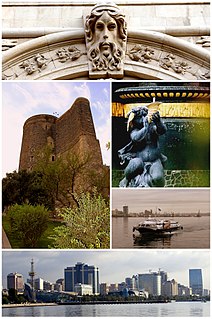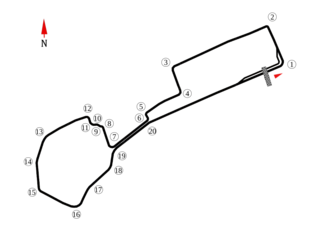
Baku is the capital and largest city of Azerbaijan, as well as the largest city on the Caspian Sea and of the Caucasus region. Baku is located 28 metres (92 ft) below sea level, which makes it the lowest lying national capital in the world and also the largest city in the world located below sea level. Baku lies on the southern shore of the Absheron Peninsula, alongside the Bay of Baku. At the beginning of 2009, Baku's urban population was estimated at just over two million people. Officially, about 25 percent of all inhabitants of the country live in Baku's metropolitan area. Baku is the sole metropolis in Azerbaijan.

Azerbaijani or Azeri, sometimes also Azeri Turkic or Azeri Turkish, is a term referring to two Turkic lects that are spoken primarily by the Azerbaijanis, who live mainly in Transcaucasia and Iran. Caucasian Azerbaijani and Iranian Azerbaijani have significant differences in phonology, lexicon, morphology, syntax, and sources of loanwords. ISO 639-3 groups the two lects as a "macrolanguage".

The Nakhchivan Autonomous Republic is a landlocked exclave of the Republic of Azerbaijan. The region covers 5,500 km2 (2,100 sq mi) with a population of 414,900, bordering Armenia to the east and north, Iran to the south and west, and Turkey to the northwest.

Heydar Alirza oglu Aliyev was an Azerbaijani politician who served as the third President of Azerbaijan from October 1993 to October 2003. As national president he held constitutional powers, but his influence on Azerbaijani politics had begun years earlier. As a young man he had joined the Azerbaijan SSR People's Commissariat for State Security (NKGB) and quickly rose to the rank of Major-General.

Azerbaijan, officially the Azerbaijan Soviet Socialist Republic, also referred to as Soviet Azerbaijan, was one of the constituent republics of the Soviet Union between 1922 and 1991. Created on 28 April 1920 when Soviet Russia brought pro-Soviet figures to power in the region, the first two years of the Azerbaijani SSR were as an independent country until incorporation into the Transcausasian SFSR, along with the Armenian SSR and the Georgian SSR.
Azerbaijan is administratively divided into the following subdivisions:

East Azerbaijan Province is one of the 31 provinces of Iran. It is located in Iranian Azerbaijan, bordering with Armenia, Republic of Azerbaijan, Ardabil Province, West Azerbaijan Province, and Zanjan Province. The capital of East Azerbaijan is Tabriz. East Azerbaijan Province is in Regions 3 of Iran, with its secretariat located in its capital city, Tabriz.

The Azerbaijan national football team is the national football team of Azerbaijan and is controlled by Association of Football Federations of Azerbaijan. It represents Azerbaijan in international football competitions. The majority of Azerbaijan's home matches are held at the national stadium, Baku Olympic Stadium, with friendly matches sometimes hosted at club stadiums.

Azerbaijanis or Azeris, also known as Azerbaijani Turks, are a Turkic people living mainly in the Iranian region of Azerbaijan and the sovereign Republic of Azerbaijan. They are the second-most numerous ethnic group among the Turkic peoples after Anatolian Turks. They are predominantly Shi'i Muslims. They comprise the largest ethnic group in the Republic of Azerbaijan and the second-largest ethnic group in neighboring Iran and Georgia. The world's largest number of ethnic Azerbaijanis live in Iran, followed by the Republic of Azerbaijan.

Azerbaijan or Azarbaijan, also known as Iranian Azerbaijan, is a historical region in northwestern Iran that borders Iraq, Turkey, the Nakhchivan Autonomous Republic, Armenia, and the Republic of Azerbaijan. Iranian Azerbaijan is administratively divided into West Azerbaijan, East Azerbaijan, Ardabil, and Zanjan provinces. The region is mostly populated by Azeris, with minority populations of Kurds, Armenians, Tats, Talysh, Assyrians and Persians.

The Republic of Artsakh, or simply Artsakh, also known by its second official name, the Nagorno-Karabakh Republic, is a de facto independent country in the South Caucasus that is internationally recognized as part of Azerbaijan. The region is currently populated mostly by Armenians and the primary spoken language is Armenian. Artsakh controls most of the territory of the former Nagorno-Karabakh Autonomous Oblast and some of the surrounding area, giving it a border with Armenia to the west and Iran to the south. Its capital is Stepanakert.

The Nagorno-Karabakh War was an ethnic and territorial conflict that took place in the late 1980s to May 1994, in the enclave of Nagorno-Karabakh in southwestern Azerbaijan, between the majority ethnic Armenians of Nagorno-Karabakh backed by the Republic of Armenia, and the Republic of Azerbaijan. As the war progressed, Armenia and Azerbaijan, both former Soviet Republics, entangled themselves in a protracted, undeclared war in the mountainous heights of Karabakh as Azerbaijan attempted to curb the secessionist movement in Nagorno-Karabakh. The enclave's parliament had voted in favor of uniting itself with Armenia and a referendum, boycotted by the Azerbaijani population of Nagorno-Karabakh, was held, whereby most of the voters voted in favor of independence. The demand to unify with Armenia began in a relatively peaceful manner in 1988; in the following months, as the Soviet Union disintegrated, it gradually grew into an increasingly violent conflict between Armenians and Azerbaijanis, resulting in claims of ethnic cleansing by both sides.
Azerbaijan is a country in the Caucasus region of Eurasia. It is bounded by Caspian Sea to the east, Russia's Daghestan region to the north, Georgia to the north-west, Armenia and Turkey to the south-west, and Iran to the south. Azerbaijan is a home to various ethnicities, majority of which are Azerbaijani, a Turkic ethnic group which numbers close to 9 million in the independent Republic of Azerbaijan.

The Nagorno-Karabakh conflict is a territorial and ethnic conflict between Armenia and Azerbaijan over the disputed region of Nagorno-Karabakh and seven surrounding districts, which are de facto controlled by the self-declared Republic of Artsakh, but are internationally recognized as de jure part of Azerbaijan. The conflict has its origins in the early 20th century. Under the Soviet Union, Joseph Stalin decided to make the Nagorno-Karabakh region, historically Armenian and with a majority-Armenian population, an autonomous oblast in Soviet Azerbaijan. The present conflict began in 1988, when the Karabakh Armenians demanded that Karabakh be transferred from Soviet Azerbaijan to Soviet Armenia. The conflict escalated into a full-scale war in the early 1990s.
A complete list of films produced in the country of Azerbaijan ordered by year of release and decade on separate pages:
Qədili is a village in the Qubadli Rayon of Azerbaijan.

Ilham Heydar oglu Aliyev is an Azerbaijani politician who is the fourth President of Azerbaijan, in office since 2003. He also functions as the Chairman of the New Azerbaijan Party and the head of the National Olympic Committee.

The 2019 Azerbaijan Grand Prix was a Formula One motor race that took place on 28 April 2019 at the Baku City Circuit in Baku, Azerbaijan. The race was the fourth round of the 2019 Formula One World Championship, and marked the third time that the Azerbaijan Grand Prix had been run as a round of the Formula One World Championship.
International schools in Azerbaijan are schools where general education activities are carried out according to the regulations of the Constitution of Law on Education of Azerbaijan and other relevant orders.















